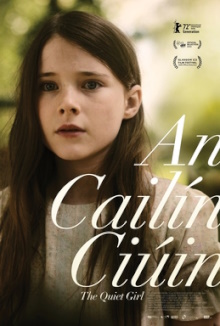Like its title, this is a quiet, low-key film that breaks no new ground but is well made and its story so sweet that it’s impossible to dislike. It was adapted from a short story Foster by well known Irish writer Claire Keegan, and is the directorial debut of Colm Bairéad. But really it is child actress Catherine Clinch who carries the film. This is also notable in that it’s mostly in the Irish language and so most people will need subtitles for it. Yet the lines of English that it has are delivered in such a thick accent that you’d likely need subtitles for them too!
In rural Ireland, 9-year-old Cáit is one of too many children to a mother who neglects them and a father who drinks too much. Let to her devices, she is undernourished, does poorly at school and keeps quiet much of the time. When her mother becomes pregnant again, she is sent to live with relatives for the summer, the childless Cinnsealach couple who run their own farm. The wife Eibhlín is immediately welcoming to her, washing her and brushing her hair, making sure she is properly fed and being patient when she wets the bed. The husband Seán is more reticent at first, but changes his attitude when he berates her for wandering off while he is doing chores only to realize that she is trying to help him. He insists that they go to town to buy new clothes for her. She realizes after being questioned by a nosy neighbor that the couple once had a son of their own who died and the clothes she has and the room belonged to him. Thus for the first time in her life, Cáit feels what it is like to have loving parents.
There’s not much to say about this film as it’s so straightforward and astute audiences already know exactly how it will play out. Its strength lies in the perfect execution, especially the strong performances by all of the actors, and the Irish background. I note that it plays into the stereotype of poor Irish families having so many children that they are unable to raise them properly. The film itself makes no mention of this, but historically this is related to the strength of the Catholic faith in Ireland. Effectively, the film is making the case that large families aren’t necessarily a good thing, but this is the kind of message that would be awkward to deliver out loud. I note that Cáit here not only doesn’t have a loving relationship with her irresponsible parents, she seems to be held at a distance by her sisters as well who form a clique of their own. This film isn’t complex enough to examine why this is the case so we just have to take it at face value.
In practical terms, it’s interesting to note how this film succeeds in making its back to basics approach work. For one thing there is no background music to crudely manipulate the audience’s emotions, letting the imagery and the acting do all of the heavy lifting. It’s also relatively restrained in showing the neglect of Cáit’s parents. This would be another kind of film entirely if her father were physically abusive as the moral imperative of getting her away would then be obvious. Instead her parents do the bare minimum to raise their children, so while she would be better off with the Cinnsealachs, forcing the issue with her parents still represents a moral quandary. There’s a delicious tension in how Cinnsealachs think very little of how poorly her parents run their household yet are constrained by manners and family ties from criticizing them directly. All this helps enrich what is at heart a very simple story.
This is perhaps still too simple a film to make a lasting impression on me and even subtle as it is, its manipulation seems too overt in some ways. I mean they visibly put makeup on Cáit to show how well she cleans up. It actually looks a little funny. It’s only so much I can like in such a basic premise but it certainly is a solid film that deserves the praise it has earned.
